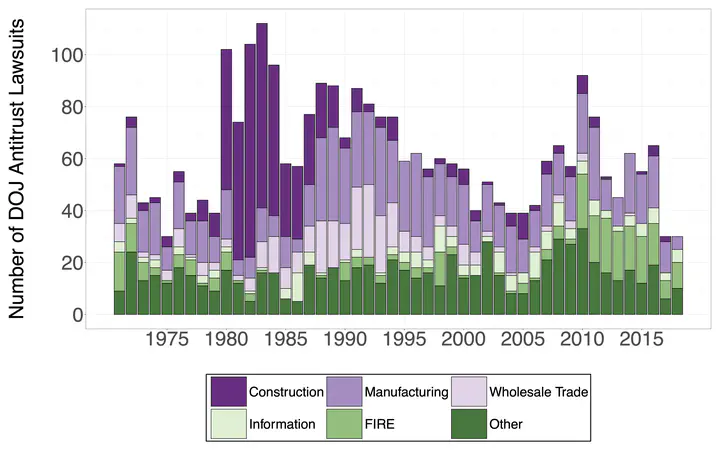Antitrust Enforcement Increases Economic Activity

Presented at EFA, AEA and NBER SI, Boston College, the Center for Equitable Growth, Columbia University, the Department of Justice Antitrust Division, Emory University, the Entrepreneurship Junior Group Online Seminars, the Labor and Finance Group Conference, NYU WARPFIN Conference, the Stigler Center for the Study of the Economy and the State, the Stigler Center 2023 Antitrust and Competition Conference, the University of Melbourne, and the University of Warwick
Abstract: We hand-collect and standardize information describing all 3,055 antitrust lawsuits brought by the Department of Justice (DOJ) between 1971 and 2018. Using restricted establishment-level microdata from the U.S. Census, we compare the economic outcomes of a non-tradable industry in states targeted by DOJ antitrust lawsuits to outcomes of the same industry in other states that were not targeted. We document that DOJ antitrust enforcement actions permanently increase employment by 5.4% and business formation by 4.1%. Using an event-study design, we find (1) a sharp increase in payroll that exceeds the increase in employment, meaning that DOJ antitrust enforcement increases average wages, (2) an economically smaller increase in sales that is statistically insignificant, and (3) a precise increase in the labor share. While we cannot separately measure the quantity and price of output, the increase in production inputs (employment), together with a proportionally smaller increase in sales, strongly suggests that these DOJ antitrust enforcement actions increase the quantity of output and simultaneously decrease the price of output. Our results show that government antitrust enforcement leads to persistently higher levels of economic activity in targeted industries.